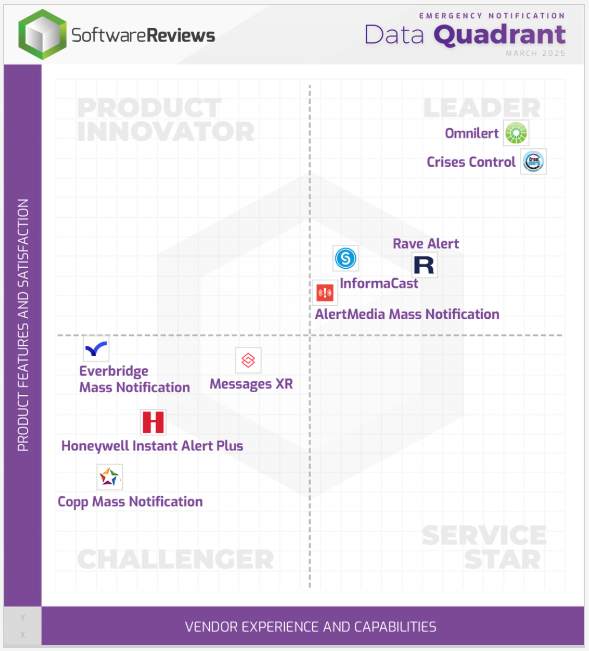Written by Anneri Fourie | Crises Control Executive
The Hidden Risks of Poor Communication During a Crisis
Emergencies don’t wait. Whether it’s a cyberattack, power outage, or extreme weather, how your business responds in those first few moments can make all the difference. Yet many organisations are still relying on outdated communication systems that aren’t built for high-pressure situations — systems that break down, delay responses, and spread confusion when clarity is needed most.
The real risk? Miscommunication can quickly escalate a manageable issue into a full-blown crisis.
Crises Control is a platform designed specifically to solve this problem. It gives businesses a fast, reliable way to keep people informed, aligned, and ready to act. These claims are backed by real user experiences — Crises Control has earned top marks on SoftwareReviews.com, with strong customer feedback and performance metrics that reflect its reliability when it matters most.
In this blog, we’ll take a closer look at those Crises Control reviews, how the platform compares to other tools, and why so many businesses are turning to it to take control of crisis communication.
What Makes Crises Control Stand Out?
So, what makes Crises Control different from the many other emergency communication platforms out there? It all comes down to reliability, flexibility, and user-focused design. Businesses need a platform that they can rely on in a crisis — something that won’t fail under pressure and will make communication seamless, even when chaos reigns.
Here are some key features that users rave about:
1. Real-Time Alerts and Notifications
When a crisis hits, every second counts. Crises Control ensures your team receives real-time alerts across multiple channels, such as SMS, email, voice calls, and mobile app notifications. This means that no matter where your team members are, they will be instantly notified of any urgent situations.
2. Multi-Channel Communication
Not everyone checks their email or text messages at the same time. That’s why Crises Control uses multiple communication channels, ensuring that everyone, whether they prefer SMS, email, or app notifications, is reached in a way that suits them. This approach ensures that messages never get lost or delayed.
3. Centralised Crisis Management
Managing a crisis is not just about sending out alerts; it’s about coordination. Crises Control offers a centralised hub where you can track progress, assign tasks, and make decisions all in one place. This centralisation ensures your team is always on the same page and can act swiftly and effectively.
4. Compliance and Reporting
Crises Control is built with compliance in mind. It adheres to essential industry standards, including GDPR and ISO regulations, so you don’t have to worry about security breaches or non-compliance during a crisis. Additionally, the platform provides detailed reporting, ensuring that your organisation stays accountable and transparent.
Crises Control vs Other Emergency Software
When choosing emergency communication software, it’s crucial to compare your options. So, how does Crises Control stack up against other platforms in the market? Let’s take a closer look at the key differences that set Crises Control apart.
Speed and Reliability
During an emergency, delays can be costly — both in time and resources. That’s why speed and reliability are at the core of Crises Control. The platform consistently earns high ratings for performance, meaning that alerts are sent out swiftly and reliably without unnecessary delays. While other tools may offer similar features, Crises Control is often regarded as faster and more dependable.
Ease of Use
Crises Control isn’t just built for tech-savvy professionals; it’s designed with everyone in mind. The user interface is intuitive and simple, meaning that your team doesn’t need extensive training to get started. This ease of use is a critical factor during a crisis when you need everyone to jump into action quickly, not waste time figuring out how the software works.
Integration and Customisation
Another major advantage of Crises Control is its ability to integrate seamlessly with the systems you’re already using. Whether it’s your CRM, HR software, or other business tools, Crises Control fits into your existing infrastructure with minimal fuss. It’s a level of flexibility that many of its competitors don’t offer, and it means that the platform can be tailored to meet the unique needs of your business.
Crises Control in Numbers: What Users Are Saying
When deciding which emergency communication software to choose, it’s essential to look at user feedback. Here’s a closer look at the metrics from softwarereviews.com that show why so many businesses trust Crises Control:
- 100% Plan to Review: Every user who has engaged with Crises Control has felt confident enough to provide feedback. This speaks to the level of trust and satisfaction the platform generates.
- 93% Likeliness to Recommend: The fact that 93% of users say they would recommend Crises Control to other businesses highlights the strong reputation it has built among its users.
- 88% Satisfaction of Cost Relative to Value: When it comes to value for money, Crises Control excels. Users report that they receive high-end features at a cost-effective price, making it a smart long-term investment.
- 82% Feature Ratings: Users consistently rate Crises Control highly for its features, with particular praise for its comprehensive crisis management tools.
- 85% Vendor Capability Ratings: This score shows that users find Crises Control to be a reliable vendor, offering excellent support, continuous product updates, and a commitment to meeting customer needs.
Top Pros of Crises Control
Beyond the impressive metrics, users point to specific strengths that make Crises Control the go-to tool for crisis management:
- Helps Innovate: Crises Control continually rolls out new features and improvements, ensuring that businesses have access to the latest tools in crisis management.
- Reliability: Users appreciate that Crises Control is dependable when it matters most, helping them respond quickly and effectively in a crisis.
- Performance Enhancing: Businesses report that Crises Control enhances their performance during emergencies, enabling faster decision-making and improved response times.
How Crises Control Helps Your Business
It’s clear that Crises Control offers many advantages, but how does it specifically benefit your business? Here are a few ways Crises Control adds value:
1. Mitigates Risks
Effective communication is crucial during a crisis. Without a reliable platform, poor communication can amplify the risks your business faces. Crises Control reduces these risks by ensuring your messages reach the right people at the right time, enabling your business to respond to emergencies faster and more effectively.
2. Improves Coordination
In a crisis, it’s easy for things to get chaotic. Crises Control streamlines your response efforts by keeping everything in one place. From tracking tasks to coordinating efforts across teams, Crises Control helps businesses maintain control, even when things feel out of control.
3. Enhances Business Continuity
A major advantage of Crises Control is that it doesn’t just handle crises — it helps businesses bounce back more quickly. By facilitating internal and external communication, Crises Control ensures that your business can return to normal operations faster after a crisis has passed.
4. Ensures Compliance
Crises Control is built to help businesses stay compliant with regulations like GDPR. In an emergency, you need a platform that not only secures your data, but also ensures that your communications are transparent and traceable — Crises Control delivers on both fronts.
What Users Are Saying About Crises Control
Real user reviews offer valuable insights into how Crises Control performs in real-world situations. Here’s what some users have to say:
“Crises Control’s ability to send real-time alerts across multiple channels has been a game-changer for us. Whether it’s a cyberattack or a natural disaster, we can ensure everyone is informed immediately.”
“We used to rely on multiple tools for emergency communication. Crises Control has centralised everything, saving us time and effort, and making our response more effective.”
“Crises Control was useful during a recent natural disaster, because it could be used to target people in different locations and languages. We quickly found and told the affected employees what was going on in their language. The real-time reporting dashboard helped us keep track of the situation and make decisions to protect our employees and business. The mobile app could be better, but the software is easy to use and has lots of useful features. It’s an important part of our emergency plan. I highly recommend this crisis communication software to any organisation looking to improve their emergency notifications.”
These testimonials reflect the trust that businesses place in Crises Control. The platform’s ability to deliver in high-pressure situations has made it a trusted tool for companies across industries.
Conclusion: Try Crises Control for Yourself
In conclusion, Crises Control stands out as one of the best emergency communication software solutions available today. With its speed, reliability, user-friendly interface, and robust feature set, it’s no surprise that businesses continue to choose Crises Control to manage their crisis communications.
Ready to see how Crises Control can improve your emergency response and business continuity? Contact us today to book a free demo and discover how our platform can transform your crisis management processes.
Request a FREE Demo


